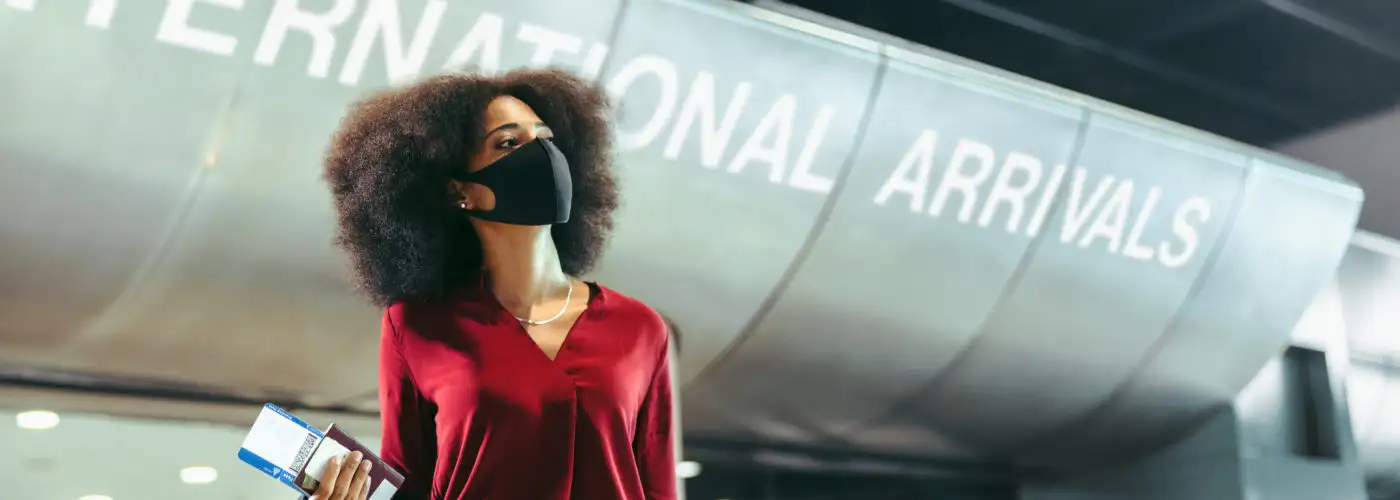Travel (especially in coach class) doesn’t allow for a lot of personal space. The COVID-19 pandemic certainly isn’t over, but the federal mask mandate requiring face coverings on planes, trains, and in airports has been lifted—so should travelers be concerned about flying or taking public transportation now?
How Much Has the Risk of Contracting COVID During Travel Increased Without Masks Being Required?
Dr. Pia MacDonald, an Infectious disease epidemiologist at RTI International, tells SmarterTravel, “The risk of getting the virus has increased with decreased mask mandates and requirements.”
Planes are equipped with hospital-grade HEPA air filters that help reduce the risk of catching COVID in-flight—however, studies have shown that the chances are not zero, especially if you’re seated within a few rows of an infected passenger. Additionally, the filtered system only operates when the airplane’s ventilation is turned on, and it is generally not on while the aircraft is on the ground. This means that during crowded situations (like boarding and deplaning), flyers are especially at risk when not wearing a mask.
There’s even more of a risk of catching the virus when traveling on land. Buses, subways, and trains are poorly ventilated, meaning there is an increased danger to travelers. If you’re on a crowded train or bus, you’ll definitely want to keep your mask on.
The Centers for Disease Control and Prevention (CDC) still recommends wearing a mask on public transportation, advising in a statement, “It is CDC’s continuing assessment that at this time an order requiring masking in the indoor transportation corridor remains necessary for the public health.”
How Much Protection Does Wearing a Mask During Travel Provide?
If you wear a mask while traveling (but no one around you does), how much protection will you have against COVID? One-way masking can offer significant protection, however, Dr. MacDonald advises, “The quality of the mask and the fit matter significantly in terms of individual protection. A close-fitting N95 or K94 mask reduces the risk of getting or transmitting SARS-CoV-2 for an individual.”
A high-quality and well-fitting mask will offer you more protection than a cloth or loose-fitting mask. “N95 and K95 masks are particularly good because they have many fiber layers that are electrostatically charged and trap viruses which help protect the wearer even if those around them are not wearing masks,” says MacDonald.
An added bonus: Continuing to wear a mask (even when it’s not required) on public transportation will reduce the risk of getting other infectious diseases like the flu or a cold that can ruin your trip.
How Can Travelers Protect Themselves?
Reduce your chances of getting infected with COVID while traveling by following these guidelines:
- Before traveling, make sure that you are fully vaccinated against COVID
- Wear a high-quality, well-fitting mask in crowded settings
- Avoid removing your mask to eat or drink in high-risk settings (such as during boarding or deplaning)
You Might Also Like:
• The Most Expensive Airports in the U.S. To Fly From• Which US Airline’s Basic Economy Fare is the Best?
• 10 Ways to Speed Through Airport Security
• Southwest Ends Free Checked Bags for All
• The Best Ways to Kill Time at the Airport
We hand-pick everything we recommend and select items through testing and reviews. Some products are sent to us free of charge with no incentive to offer a favorable review. We offer our unbiased opinions and do not accept compensation to review products. All items are in stock and prices are accurate at the time of publication. If you buy something through our links, we may earn a commission.
Related
Top Fares From
Today's Top Travel Deals
Brought to you by ShermansTravel
Shop and Save with Country Inns...
Patricia Magaña
 Hotel & Lodging Deals
Hotel & Lodging Deals
$229 -- Chicago: Discounted Rates and...
Francesca Miele
 Hotel & Lodging Deals
$229+
Hotel & Lodging Deals
$229+
$188 -- Honolulu: Save on Oceanview...
Abigail Lamay
 Hotel & Lodging Deals
$188+
Hotel & Lodging Deals
$188+




